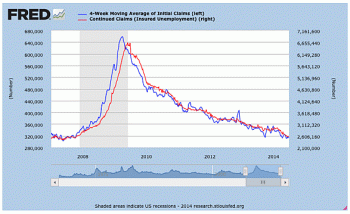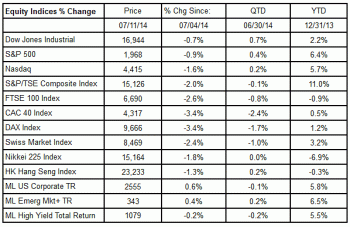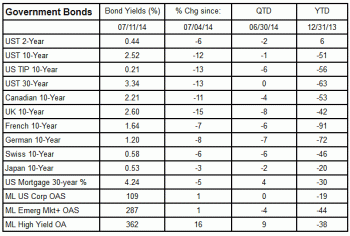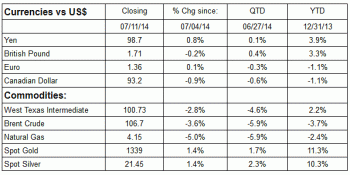John Davidson’s Economic Comments: Week ending July 13
Economic releases showed continued strength in the U.S. recovery, but softness in Europe. Alcoa reported better than expected earnings and that news leading-the-earnings-season gave Alcoa's stock a 5+% boost in an environment where equities were down on the week. High stock valuation, renewed concern about Portugal's debt, and confirmation that the U.S. Federal Reserve plans to end bond purchases in October all put a damper on equities and rallied bond markets. The "risk-off" week included a widening of credit spreads, especially those for high yield. The US dollar was mixed, energy prices were down, and metals prices were up on the week.
Perspective:
On weeks such as this when the equity markets sell off, my colleagues ask me if this is the start of a correction. Mark Hulbert's Wall Street Journal article, How Overvalued Markets Translate Into Lower Returns, referred to the work of Nobel laureate Robert Shiller to answer that question.
Professor Shiller uses six measures, all of which show that the U.S. equity market (ie S&P 500) is overvalued: Price/earnings ratio, Cyclically adjusted P/E ratio, Price/book ratio, Price/Sales ratio, Q ratio (company's market cap divided by the replacement cost of its assets), and Dividend yield. He compares those measures with the past 35 peaks. The current P/E ratio is higher than 69% of those peaks; the other valuations are higher than 82% to 89% of those peaks.
While high valuations do not have a high short term "correction" predictive value, Shiller's work shows that they do have a high correlation with lower returns over the next decade.
Therefore, going forward we are unlikely to match the 20+% post-great-recession returns or even the 10% long term average returns. Hulbert adds, "Unfortunately, none of the valuation ratios help us determine the path the market will take in producing these anemic returns. It could turn in low, but positive returns during the next 10 years, or it could soar first and then plummet, as it did in the late 1990s and early 2000s."
On the undervalued side of that balance sheet and likely to generate above average interest is U.S. soccer (or futbol as it is called in the rest of the world.) My first indication was when U.S. goalkeeper Tim Howard was briefly listed as "Secretary of Defense" by Wikipedia. My second indicator was the fact that my wife, not really a sports fan, wanted to watch the World Cup final between Argentina and Germany.
Economic Releases:
This week's Initial Claims data added evidence of an improving jobs picture in the U.S. following last week's June Employment Report. New Claims fell to 304,000 the week of July 5th. The four-week average of Claims (blue in the chart) fell to 311,500. Continuing Claims (red in the chart) rose 10,000 to 2.584. As shown in the chart, both data series fell to close to pre-great-recession levels. These series support the Fed's decision to end bond purchases (QE) in October if the Fed's forecast for the economy remains on track.
Other Economic Releases
German Industrial Production fell -1.8% in May. This data will be little noticed because the entire Country will be celebrating Germany's victory over Argentina in the World Cup. On the other hand, France's -1.7% Industrial Production in May added to the perceived weakness in the European recovery. In the UK, the Bank of England met and, as expected, kept interest rate unchanged at 0.5% and Asset Purchases unchanged at 375 billion Pounds. Industrial Production in the UK fell -0.7%; Manufacturing Output fell -1.3% in May.
Equities Markets:
Concerns about Portugal and high stock valuations contributed to the sell-off in stocks this week. The widening of high yield credit spreads generated a negative return for the High Yield Total Return Index on the week.
Bond Markets:
Bond yields and credit spreads widened fell as part of this week's "risk-off" trade.
Currencies & Commodities:
The U.S. dollar was mixed on the week, falling against the Yen and Euro and rising against the Pound and the Looney. Energy prices fell and metals commodity prices rose on the week.
John W. Davidson, CFA, started writing these Comments more than a decade ago as a personal discipline when he was promoted from portfolio manager to chief investment officer and CEO.

Most recently, he was the president of PartnerRe Asset Management Corporation, responsible for the management of PartnerRe's invested assets, which grew from $4 billion to $12 billion during his tenure. After joining PartnerRe in the fall of 2001, he hired the staff, built the trading floor and created the infrastructure to manage both fixed income and equity assets internally. He retired from PartnerRe at the end of 2008 and moved to Maine, where he focused on board work.
He has more than 35 years of industry experience, including positions with investment management responsibility for separate institutional accounts, mutual funds, trusts and insurance assets. Prior to joining PartnerRe, he served as president and chief executive officer of two other investment management companies. For various companies he has held positions as chief investment officer, chief economist, head of fixed income and portfolio manager. As a portfolio manager, Davidson managed and traded U.S. Government Securities as well as futures and options on fixed income instruments.
His real world experience is backed by a strong academic foundation, which includes earning a Master of Business Administration in finance and a Master of Arts in mathematics from Boston College, as well as a Bachelor of Arts, cum laude, in economics from Amherst College. He holds the professional designation of chartered financial analyst.
His experiences and credentials have brought him to the public as a television commentator and conference speaker. In addition to his frequent past appearances on CNBC, CNNfn, Bloomberg TV and Yahoo FinanceVision, he appeared as a special guest on Wall $treet Week with Louis Rukeyser. Reuters, Bloomberg and other business press services have quoted his views on the market. He has taught CFA preparation programs, as well as other courses offered by the Stamford and Boston CFA Societies, and the National Graduate Trust Officers' School.
Davidson is a natural leader in both his professional and personal life, having developed those skills early in his career as a naval officer. He spent three years on active duty, which included a year on the rivers of Vietnam, and 24 years in the Naval Reserve, from which he retired as a captain in 1994.
Davidson is treasurer and board member of the Camden Conference. He is also on the investment committee of the Pen Bay Health Foundation. He serves as an independent trustee for mutual funds.
In his leisure time, he is an active sailor, tennis player and skier. With his wife, Barbara, he renovated a 100+-year-old home in Camden, where they enjoy spending time with their two golden retrievers and having visits from their five children. He can be reached at jwdbond@me.com.


























